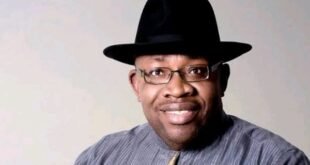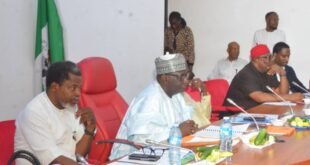The Presidency has given a strong response to a New York Times report on Nigeria’s economic situation, characterizing the article as “misleading”, “misleading” and “typical of the prescriptive and insulting manner” in which foreign media often report situation in Africa. country.
In his full statement, the President’s Special Adviser on Information and Strategy, Bayo Onanuga, Sunday, delivered a detailed rebuttal, emphasizing that President Bola Tinubu inherited an economy in shambles when he took office in May 2023.
The President’s administration paints a vivid picture of an economy bleeding from decades of mismanagement, with a huge infrastructure deficit, an unsustainable fuel subsidy regime and a plummeting currency.
According to the Presidency, the Tinubu government must undertake “urgent operations” to prevent an economic collapse like Zimbabwe and Venezuela. Government policy decisions, including the elimination of fuel subsidies and unification of the exchange rate, were taken to stem economic bleeding and restore stability.
The Presidency acknowledged the challenges facing Nigerians amidst the inflationary spiral but highlighted the positive aspects of the economy and the remedial policies implemented. The report cited the economy’s trade surplus, portfolio investment, and loans from the World Bank and other institutions as evidence of recovering confidence.
The government assured that it is working hard to tackle food inflation, by increasing agricultural production, retail stores selling raw food at lower prices, and providing incentives for farmers. The report notes that Nigeria is not the only one facing a cost of living crisis, citing the United States and Europe as examples, and expresses optimism that the country will overcome its difficulties as it has in the past.
“The report, based on several interviews, is very gloomy, gloomy and full of doom, as it never mentions the positive aspects in the economy as well as the remedial policies implemented by the central and state governments.
“What is certain is that President Tinubu did not create the economic problems Nigeria is facing today. He inherited it. As a leading economist in our country once said, Tinubu inherited a dead economy.
“The economy is bleeding and needs quick surgery to prevent it from falling into an abyss, as happened in Zimbabwe and Venezuela.
“For decades, Nigeria has maintained a fuel subsidy regime that drained $84.39 billion between 2005 and 2022 from state coffers in a country that suffers from a huge infrastructure deficit and is in dire need of better social services for its citizens.
“The state oil company, NNPC, the sole importer, has racked up debts of trillions of naira as it absorbs unsustainable subsidy payments on its books. When President Tinubu assumed leadership of the country, no provision was made for the payment of fuel subsidies in the national budget after June 2023.
Also read: Nigeria, the increasing debt profile of other African countries forces AfDB to launch ADMIN
“The budget itself has a striking feature: it plans to spend 97 percent of its revenues on debt repayments, with little left over for recurrent or capital spending. Previous governments had borrowed heavily to cover these costs.
“Like oil, the exchange rate is also subsidized by the government, with an estimated $1.5 billion spent every month by the CBN to ‘defend’ the currency against the country’s import-dependent economy’s unquenchable demand for dollars.
“President Tinubu must tackle the cancer of public finances on day one by rolling back the subsidies and largesse regime that is spreading to neighboring countries. Later, his government raised the value of the naira.
“After a stormy few months, with the value of the naira plummeting to N1,900 against the US dollar, stability has been restored, although some challenges remain. The exchange rate is now below N1500 to the dollar, and there is a prospect that the naira will regain strength and appreciate to between N1000 and N1200 before the end of the year.
“The economy recorded a trade surplus of N6.52 trillion in the first quarter, compared with a deficit of N1.4 trillion in the fourth quarter of 2023. Portfolio investors are coming in as long-term investors.
“When Diageo wanted to sell its stake in Guinness Nigeria, Singaporean conglomerate Tolaram was ready to take over. With the World Bank’s entry of $2.25 billion in loans and other loans from AfDB and Afreximbank, Nigeria became bankable again. This happened because the reforms implemented had restored trust.
“The rate of inflation is slowing, as seen in figures released by the National Bureau of Statistics in April. Food inflation remains the biggest challenge, and the government is working hard to control it through increasing agricultural production.
“The Tinubu administration and the 36 states are working hard to produce food in large quantities to reduce costs. Some state governments, such as Lagos and Akwa Ibom, have set up retail stores to sell raw foodstuffs to residents at prices lower than market prices.
“The Tinubu administration, in November last year, in line with the food emergency declaration, made massive investments in dry season agriculture, providing incentives to farmers to produce wheat, maize and rice. The CBN has donated N100 billion worth of fertilizer to farmers, and a number of incentives are being implemented. In western Nigeria, six governors have announced plans to make massive investments in agriculture.
“Nigeria is not the only country in the world facing a rising cost of living crisis. America is also facing a similar crisis, where many families are having difficulty making ends meet. US Treasury Secretary Janet Yellen raised these concerns recently. Europe is also experiencing a cost of living crisis.
“While these countries are trying to overcome these problems, the Tinubu administration is also working hard to address the economic problems in Nigeria.
“Our country has faced economic hardship in the past, an experience that is captured in folk songs. Just as we managed to overcome it then, we will soon overcome our current difficulties.
The response from the Presidency is a clear indication that the government will not let criticism go unpunished, especially if the criticism comes from foreign media which is considered to have a biased narrative against African countries.
The post Presidency hits back at New York Times, says Tinubu inherited a “dead economy” that needs immediate surgery appeared first on Latest Nigerian News | Top News from Ripples Nigeria.
 JamzNG Latest News, Gist, Entertainment in Nigeria
JamzNG Latest News, Gist, Entertainment in Nigeria








